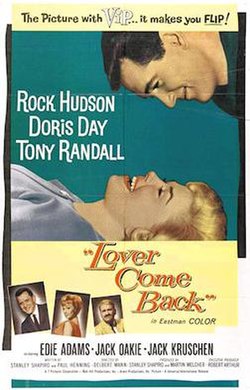Plot
In a Manhattan advertising agency, Jerry Webster, a Madison Avenue ad executive, has achieved success not through hard work or intelligence but by wining and dining his clients and setting them up on dates with attractive women.
Jerry's equal and sworn enemy at a rival agency is Carol Templeton. Although she has never met him, Carol is disgusted by Jerry's unethical tactics and reports him to the Ad Council. Jerry avoids trouble with his usual aplomb, sending a comely chorus girl, Rebel Davis, to seduce the council members.
In exchange for her cooperation, Jerry promised Rebel a spot in commercials, so he goes ahead and arranges shoots of some featuring her for "VIP", a nonexistent product. He has no intention of allowing them to be shown, but the perplexed company president, Pete Ramsey, orders them broadcast on television.
This means Jerry must come up with a product quickly. He bribes a Nobel Prize winning chemist, Dr. Linus Tyler, to create one. When Carol mistakes Jerry for Tyler, he pretends to be the chemist, so that in her attempt to steal the account from Jerry she is actually wining, dining, golfing, and frolicking at the beach with him as Tyler.
Carol ultimately learns the truth. Her employer figures it out. When she realizes she has been deceived she leaves Jerry stranded at the beach.
Appalled, she once more reports him to the Ad Council, this time for promoting a product that does not exist. Jerry, however, arrives at the hearing with VIP, a mint-flavored candy Dr. Tyler has just created. He provides many free samples to everyone there, including Carol.
VIP turns out to be intoxicating, each piece having the same effect as a triple martini. Its extreme effects lead to a one-night stand between Carol (who has a low tolerance for alcohol) and her bitter rival, Jerry, in a motel in Maryland, complete with a marriage license.
Carol has the marriage annulled. Representatives from the liquor industry visit Jerry, saying he will be paid well to pull VIP off the market and destroy the formula. Jerry convinces them to give Carol's firm 25% of its $60 million ($600 million today) annual advertising expenditures, then burns a confession that he has just signed that they mistake for the formula. He leaves New York to work in his company's San Francisco branch—only to be called back nine months later to remarry Carol in a hospital maternity ward, just before she gives birth to their child.
Reception
The film received positive reviews from critics. Bosley Crowther of The New York Times called the film "one of the brightest, most delightful satiric comedies since It Happened One Night ." [5] Variety declared, "This is a funny, most-of-the-time engaging, smartly produced show." [6] Harrison's Reports gave the film a rating of "GOOD", adding: "It's lots of fun most of the time even though the theme of boy fights girl, boy falls in love with girl and vice versa has been done quite often and in similar detail before." [7] Philip K. Scheuer of the Los Angeles Times wrote, "we can testify to the frequent hilarity with which everybody concerned has infused this familiar farcical mixup, double-entendres and all." [8] Brendan Gill of The New Yorker called the film "extremely funny and therefore not to be missed," [9] and Richard L. Coe of The Washington Post deemed it "funny and worldly from start to finish ... Blond Doris has never been more attractive or spirited and Hudson has become an adept farceur." [10] The Monthly Film Bulletin offered a less enthusiastic review, writing: "Alas, the aquarium scene is the film's high-water mark. After it, the sex comedy is transformed into slushy romance ... Occasionally Tony Randall's satirical zaniness salvages a laugh, but Rock Hudson and a subdued Doris Day, who do well enough with the wisecracks earlier, put little life into the love scenes when these usurp the narrative." [11]
